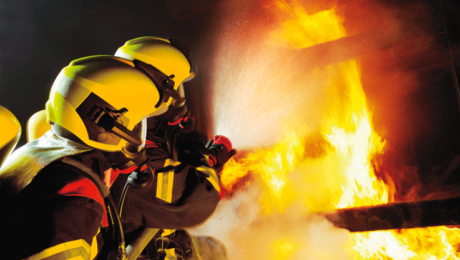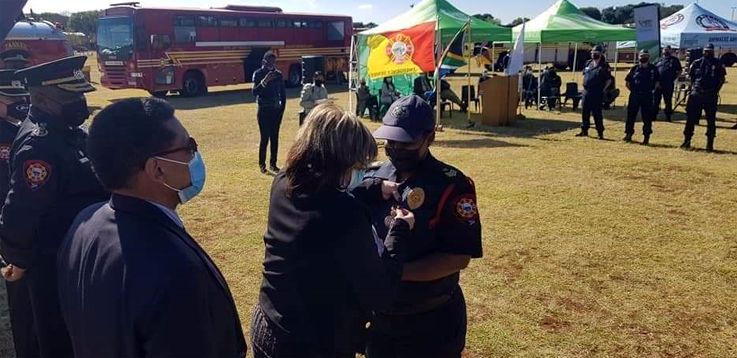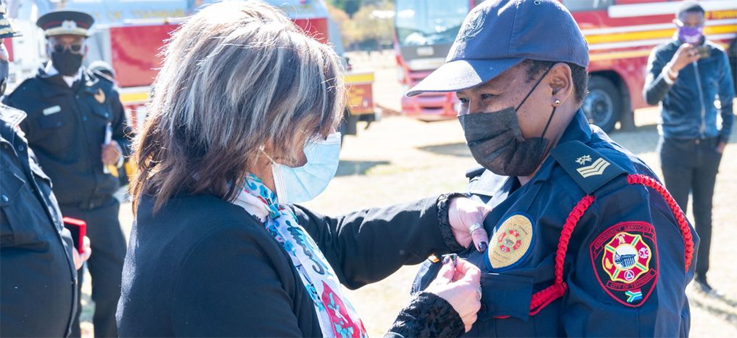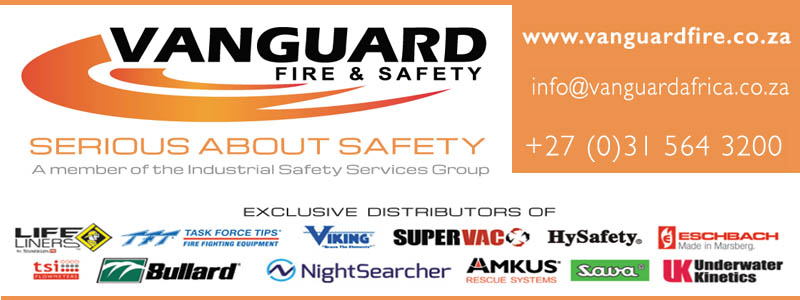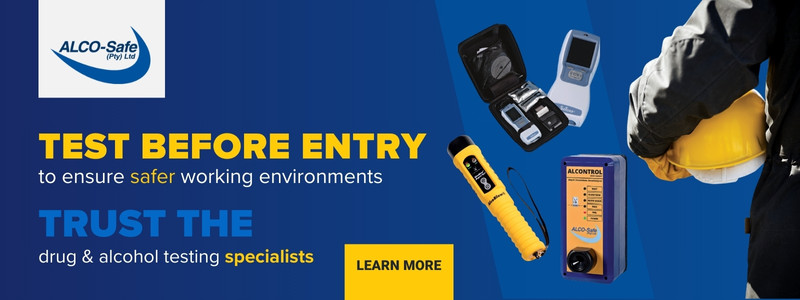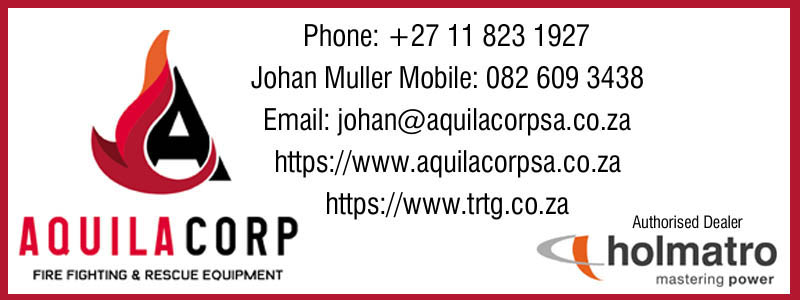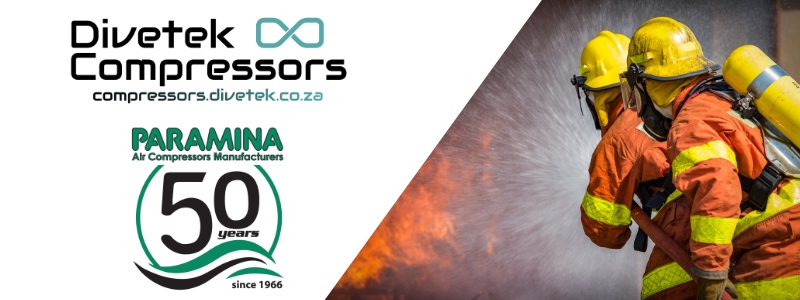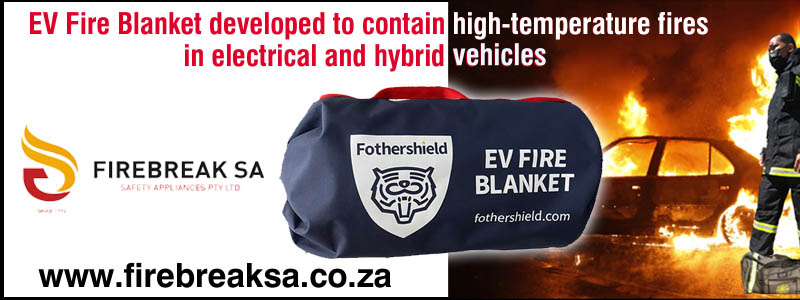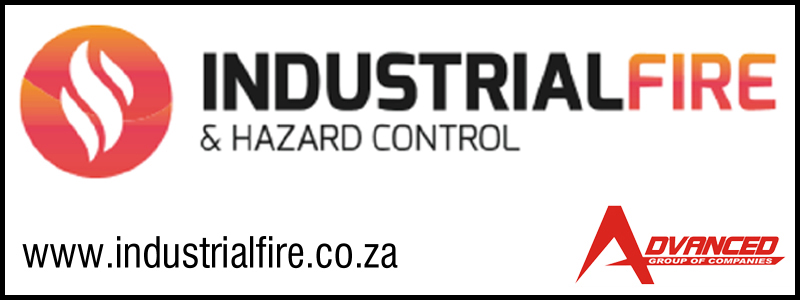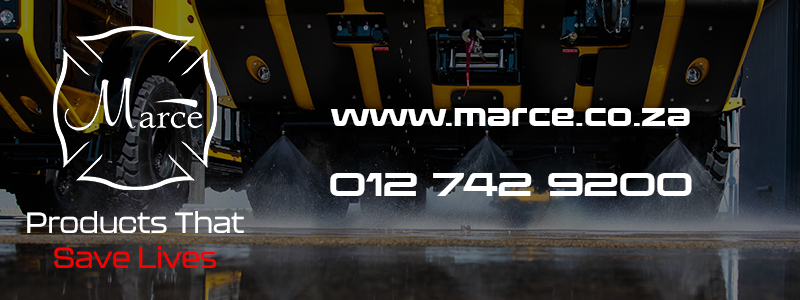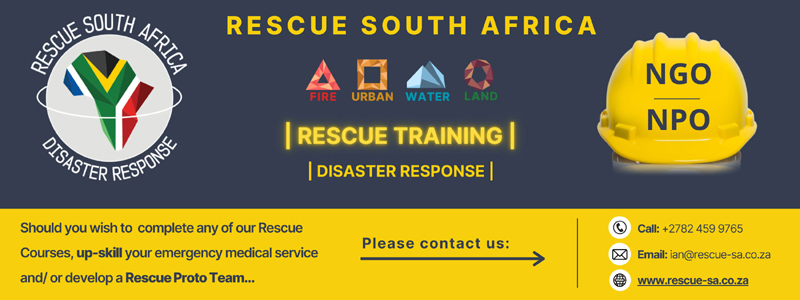POPIA Compliance – EMS Buyer’s Guide
The Emergency Services Yearbook & Buyer’s Guide would love to continue sharing our news with you, however, we value your privacy and are committed to following the regulations and requirements of POPIA. If you would rather not receive news or further correspondence from us anymore, please click the unsubscribe at the bottom of this email.
Your consent, and data security and privacy are of upmost important to us. We are fully POPIA compliant and follow all the stipulated regulations to ensure data confidentiality. We will never share your any of your information or details with any third parties.
If you would like to remain on our mailing list no action is required.
Please note that you can opt out at any time by unsubscribing.
- Published in Uncategorized
Emergence of Delta variant substantially increases risk of COVID-19 transmission
Dr Richard Friedland, chief executive officer of Netcare, recently confirmed that the surge in COVID-19 cases and high admissions to hospitals in Gauteng are directly linked to the emergence of the Delta variant in South Africa.

“Initial modelling suggested that Gauteng would experience a third wave, which would be lower than the second wave but may last longer, in other words, the so-called ‘lower for longer scenario’. This appeared to be the case until the first week of June 2021, when the daily number of positive cases started to break the trend, rising exponentially on 15 June. Since then, it has been increasing rapidly – far exceeding the peak of both the first and second waves in Gauteng. Data released on Tuesday, 29 June 2021, confirms that the Delta variant was responsible for 53% of cases sampled in early June and 75% towards the end of June,” notes Dr Friedland.
“The Delta variant is approximately 50-60% more transmissible than the Beta variant, which was responsible for the second wave in South Africa. This explains the mounting surge in cases and admissions to hospitals. Netcare is currently caring for over 2 600 COVID-19 patients across its hospitals in Gauteng. This is 45% higher than the 1 792 patients we had at the peak of the second wave, and almost 100% higher than the 1 377 patients admitted during the peak of the first wave in Gauteng.
“It also explains why we have seen whole families, school-going children, and younger people testing positive and why we have now seen the admission of patients in their in their twenties and thirties affected by the virus,” he added.
“The new COVID-19 Delta variant has been detected in at least five provinces and is now the dominant strain in South Africa. Netcare therefore welcomes the adjusted level 4 measures announced by President Cyril Ramaphosa, as this should have a material impact in helping to curtail the further spread of COVID-19 in the coastal regions, while aiding in flattening the curve.
“We however remain extremely concerned about the current situation in densely-populated Gauteng, and while these restrictions may have come too late to flatten the curve in the province, it will certainly lessen the number of infections and admissions to hospitals,” explained Dr Friedland.
Given the Delta variant’s increased transmissibility, it is now more important than ever to practise safe social distancing, fastidious attention to the wearing of masks, regular washing of hands, the use of sanitiser and avoiding social gatherings. In the absence of a completed vaccine rollout we must rely on the strictest possible non-pharmaceutical preventive measures.
“Vaccination remains a vitally important step in the fight against COVID-19, and it is crucial that individuals are registered and vaccinated as soon as they become eligible. Now, more than ever before, given the emergence of the highly contagious Delta variant, it is critical that everyone takes COVID-19 extremely seriously,” urged Dr Friedland.
Vaccination has thus far proved to be extremely effective in protecting our frontline workers. Of over 33 000 Netcare frontline workers vaccinated only 206 or 0.6% have experienced a breakthrough infection and of them, only seven required hospitalisation.
Extensive, additional preparations are ongoing at Netcare
As a result of the prevalence of the highly transmissible Delta variant, we have further strengthened and adapted our approach to ensure that we are ready, ahead of a potential surge in other provinces, to deal with the new risks in the most effective and efficient way,” he added.
Dr Friedland says Netcare’s preparations for the expected surge, especially in coastal areas, are focused on several key aspects, including additional measures to help safeguard its healthcare workers, optimising capacity to meet the demand for hospital care for COVID-19 patients, procuring additional life-saving equipment, and ensuring sufficient consumables including pharmaceutical stock.
Optimising capacity to prepare for a surge in COVID-19 patients
“We have already started scaling down on non-urgent surgery and medical admissions in our coastal hospitals, and some have suspended such surgery to rapidly create capacity for the expected increased COVID-19 patient numbers. To free up beds for COVID-19 patients, only medically necessary, time sensitive surgeries (MeNTS) will continue, based on the MeNTS scoring system, as well as emergency admission of non-COVID-19 patients,” explains Dr Friedland.
To create further capacity, plans are also in place to convert certain Medicross day theatres and other facilities to accommodate COVID-19 patients, if needed.
“Our clinical resources are being further strengthened by recruiting additional resident medical officers and clinical associates to provide continuous cover in COVID-19 zones. Several specialists have also responded to our call to join the COVID-19 teams in providing care to patients, as locally determined by hospital management and the COVID-19 clinical teams.
“To alleviate the expected pressure on our emergency departments [EDs] and to start treatment of patients as soon as possible, we will be establishing clinical decision units [CDUs] at our coastal region hospitals as a matter of urgency, in addition to those we have implemented in Gauteng. The CDUs are run and managed by the ED doctors and staffed separately from the hospitals and each consists of a number of beds, its own ablution facilities, PPE donning and doffing area and independent oxygen supply for each bed,” he adds.
Procuring additional life-saving equipment and consumables
“In addition to our already high number of ventilators and high flow nasal equipment, Netcare has procured further equipment in preparation to provide the appropriate level of care to COVID-19 patients.
“We have secured over 1 000 more mobile oxygen concentrators to bolster our fleet of 1 400 oxygen concentrators. These machines filter surrounding air, compressing it to the required density to deliver a continuous stream of purified medical grade oxygen to the patient. Importantly, this oxygen is produced without having to rely on the piped oxygen at our hospitals, thus not denuding existing oxygen capacity at the hospitals.
“In addition, we have procured another 100 ventilators, including 40 transport ventilators, which can also be used by emergency medical services personnel when transporting patients in need of oxygen. We continue to boost our extensive oxygen supply with additional bulk tanks.
Safeguarding our frontline heroes
“It is, as always, crucial to safeguard all persons working in our hospitals to the best of our ability. To reduce the footfall in our hospitals and the exposure risk this poses to healthcare workers, we have suspended visitation of patients in our Gauteng hospitals, as well as in a few of our other hospitals, unless for compassionate reasons or in exceptional circumstances.
Keeping lines of communication open
“We have employed more social workers within our facilities to counsel patients and their next-of-kin and loved ones. Next-of-kin of patients to our hospitals are encouraged to call the Netcare Family Connect Line on 0800 111 266, and one of our trained call centre professionals will facilitate a dedicated hospital representative to provide them with personal feedback daily on how their loved one in hospital is doing.
“We are glad to note that many family members are now making use of this special service to maintain contact with their loved ones. This past week alone we have connected more than 1 000 individuals with their loved ones, and we strongly encourage members of the public to avail themselves of this service.
“We wish to assure the public that we will continue to do the very best we can for all patients seeking care at any of our healthcare facilities, while ensuring their safety and that of our frontline heroes,” says Dr Friedland.
Help us to help you
“Despite the pressures placed on us, providing care is our calling, it is our driving purpose, and we are privileged to be serving our country and its people at this challenging time. In doing so, we respectfully appeal to our fellow South Africans to help us in providing them with the best possible care if they need it.
“Test for COVID-19 if you are concerned that you may have contracted the virus and seek care from your general practitioner early if you feel unwell. Many persons unfortunately still wait until their condition becomes a life-threatening emergency, which does not only endanger them but places further pressure on emergency medical services, emergency departments and hospitals,” concludes Dr Friedland.
- Published in Uncategorized
COJ – Your local fire station
Join us on a voyage down memory lane.
In our first post, we will take you to the Brixton Fire Station.
Pictures supplied by Howard Leadbeater
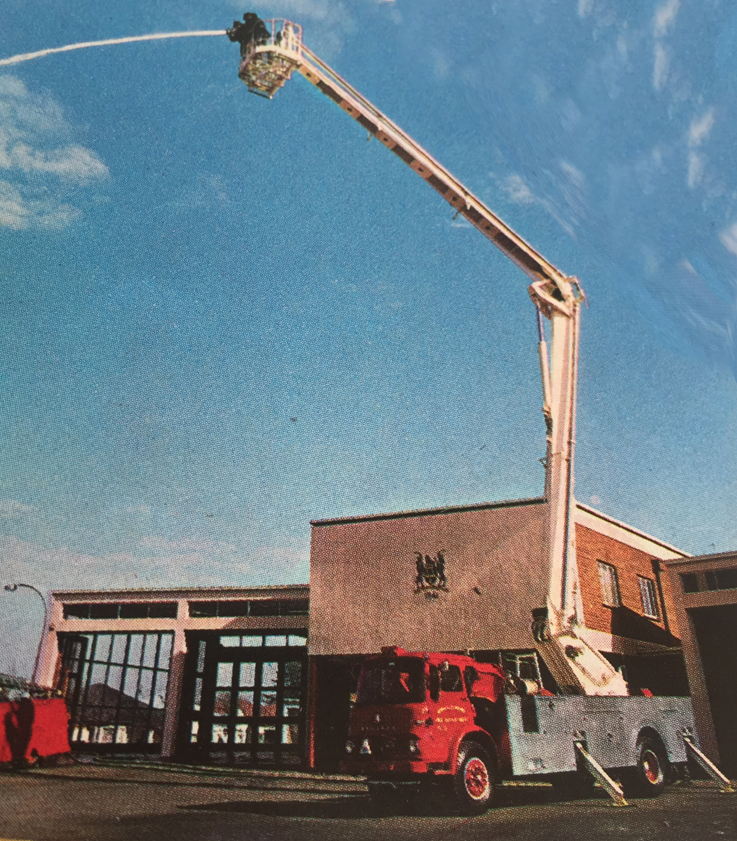

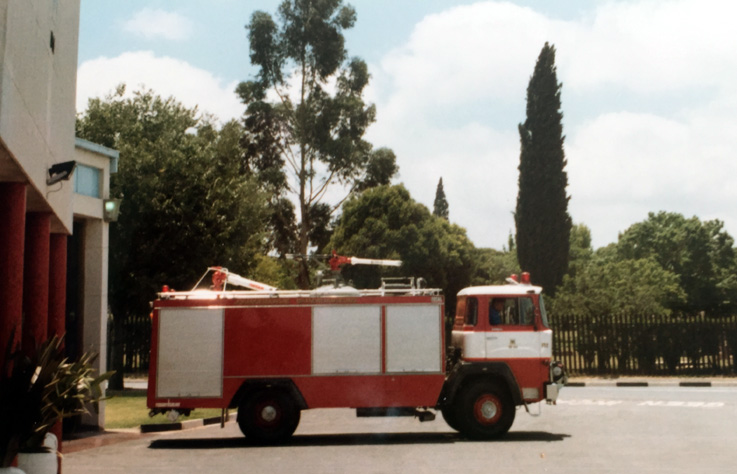
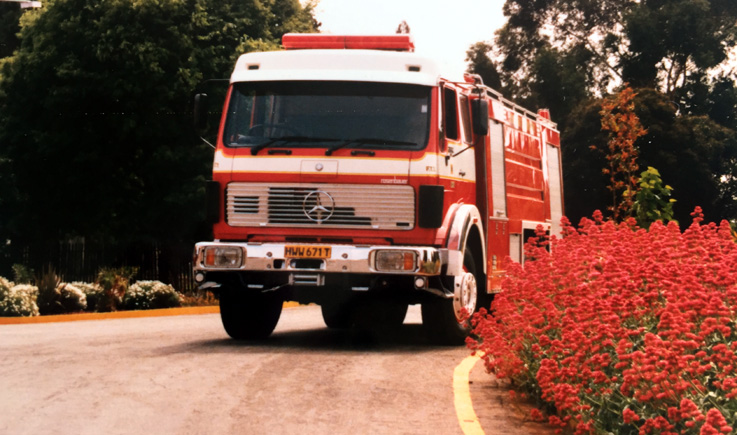
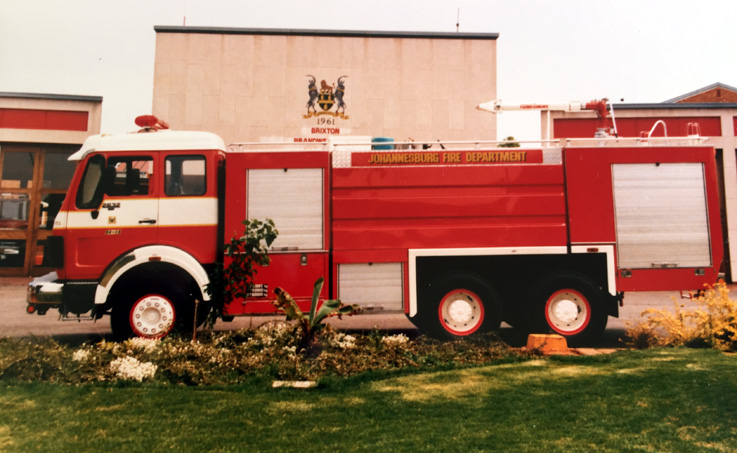
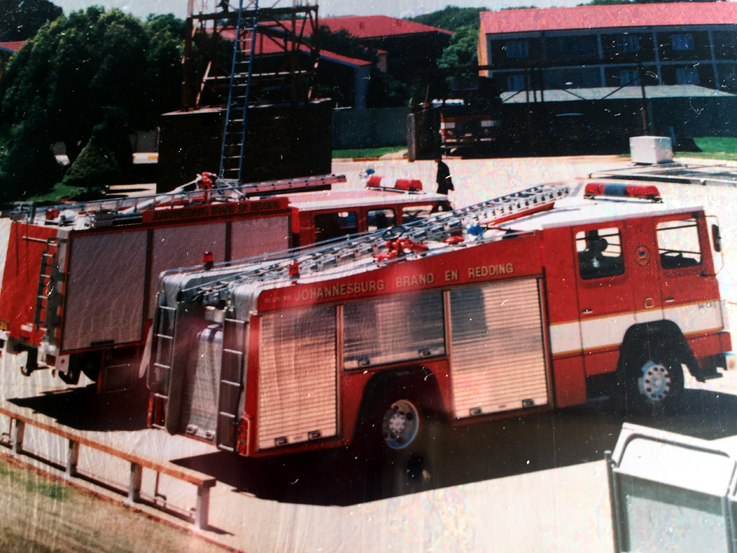
- Published in Uncategorized
Our personal experiences with COVID
By Leighton Bennett, Chairman of the Safety First Association
Both my wife and I have been hospitalised due to Covid and this first-hand experience has prompted me to write about the experience, as there is a general perception that this Covid virus pandemic is a joke. Let me tell you it is a horrific and tragic survival experience I will never ever forget.
I got home last week after a week in high care and am now slowly recovering and gaining strength.
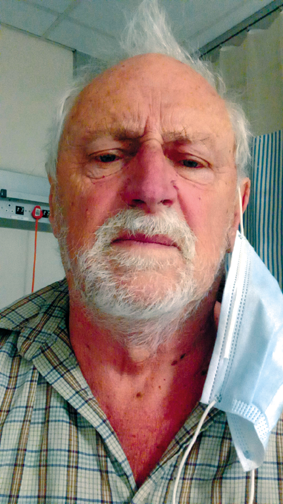
My wife was discharged and got home two days ago, after spending 29 days in hospital. She will still need several more weeks in recovery before she will be able to work again.
Both of us run businesses, a cat hotel (cattery) and my OHS consulting business. We adopted and followed all the Covid virus management safety protocols and still we don’t know how we got infected.
My wife’s Covid experience
It started with my wife not feeling well on a Friday and she went for a nasal Covid test which recorded Covid Negative, but over the weekend she felt terrible with a dry cough, chest pains and breath shortness. I took her to her doctor on Monday who, based on her symptoms said she has asthma, Covid and an x-ray confirmed pneumonia in the lungs. She was medicated and sent home to recuperate.
By Thursday midday her oxygen in the blood reading was 86% where it should be over 93%. I rushed her to the doctor who ordered an ambulance with oxygen cylinder to transport her directly to one of the northern suburbs hospitals. Some four hours later I phoned the hospital to be told she was not admitted to the cited hospital, neither was she answering her cellphone. Where was she? I was extremely worried. When I had last seen her, she she was in a shocking condition trying to breathe and she was not mentally present. The psychological and emotional stress hit me badly. I immediately thought that she is not in hospital as she has died and is now lying in a mortuary somewhere.
At 19h30 that evening my wife’s friend managed to get hold of her. She was in casualty on oxygen at another northern suburb hospital. Absolute relief after I had suffered hours of mental anguish.
The reality is that the hospital’s don’t have any Covid spare beds so you will be sent anywhere where a bed may be available. When I went into hospital some 10 days later, they were planning to send me to a hospital in Klerksdorp, when a northern suburbs hospital high-care bed became available for me.
Hospitals are currently over-flowing with 3rd wave Covid patients and are now forced to apply survival triage Covid case management. This is where a Covid patient may not be admitted into ICU if his or her chance of survival is limited, whereas others will be if they have a better chance of survival. This is not a story, this is the realty that doctors are forced to make, life and death decisions not daily but hourly, during their long 20 hour day on shift when they see some 120 patients per day.
My wife’s condition went from casualty, to a Covid ward, to high care, to sedation on a ventilator in ICU all in under 24 hours. Her condition got to a stage that she had multiple body function failures, namely asthma, Covid, pneumonia, water accumulation surrounding and interfering with her heart function, a collapsed lung, kidney and liver failure and suddenly elevated blood sugar levels due to the medication clash between the Covid and diabetes control medications. My wife actually died and with adrenalin injected into the heart and heart massage, she became a miracle who managed to survive. She later reported hearing the staff order a body bag for her.
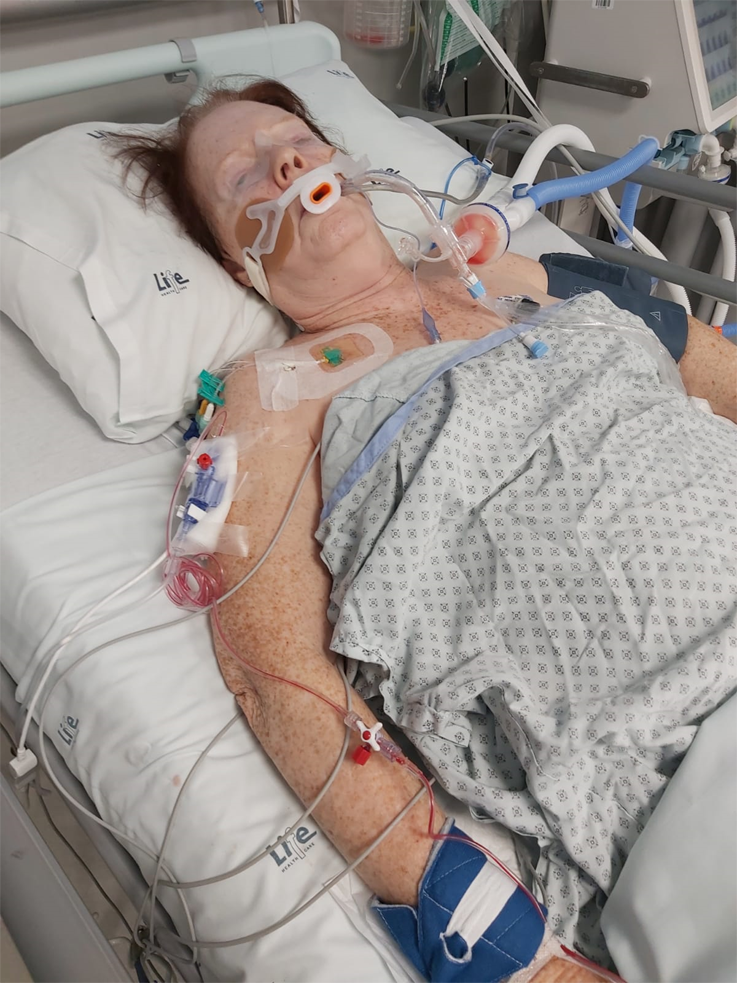
Currently her body is like a laptop that has just being rebooted, where everything has to be re-switched on and re-connected. She had to learn to walk again and was on a high litres/minute oxygen supply to get plus 93% oxygen into her blood stream. She only got home after she could breathe the normal 21% oxygen in the atmospheric air for a day or two, and she was not allowed home until we had an oxygen cylinder supply at home, for emergency purposes. Should a relapse occur, she would not be readmitted to hospital as there are no beds available with the Covid 3rd wave happening now.
My Covid experience
My Covid experience started over the weekend after my wife went into hospital. I felt unwell, had a dry cough and such severe leg and calf cramps that I couldn’t sleep for three nights. I went for a throat Covid test on Sunday which was negative. I went to see my doctor on Monday who, based on my symptoms, said I have a false negative Covid test and prescribed antibiotics, nebulizing, heavy vitamin doses and Ivermectin for a week. As the week ended, I was weak, had lost my appetite and started feeling physically useless.
On Tuesday evening my son took me to hospital where I lay in casualty overnight breathing oxygen. The next morning they started searching for a Covid bed for me. I was lucky to get a bed at a northern suburbs hospital where an x-ray confirmed I had a bacterial lung virus which only tested positive for Covid on the 7th Covid test. I went straight into a Covid ward and was then moved to a medical ward as all my Covid tests were still negative, and then a positive Covid test resulted in my medical ward mate being placed in Covid isolation and me relocated to the Covid high-care/ICU ward. This was an adapted maternity ward that had been converted to a Covid beds ward to provide more beds space.
Mornings and evenings, two bags of meds were delivered for the hospital pharmacy to give me three intravenous high dose steroids and vitamin drips that made my hand tremble like I was having Parkinsons. I was originally on 4l/min oxygen allowing me to get the 93% blood oxygen level required to breath safely. I later went off oxygen altogether when I could breathe atmospheric air for three days before being discharged.
A serious complication is that the Covid medication clashed with my diabetic sugar level control medication such that my sugar levels went up to 28.6 (with a likely diabetic coma at 32).
I am now home but still struggling to re-control my diabetes sugar levels condition with blood sugar testing every 3-4 hours currently. In hospital I was getting diabetic insulation pen in-stomach injections for up to 18 insulation units at least twice per day with on-going regular blood sugar tests.
The Covid ward reality
Over and above our Covid experience one needs to know the life and death drama playing out each day in the Covid wards.
Both northern suburb hospitals that we were admitted to have converted their maternity wards into Covid high-care and ICU wards.
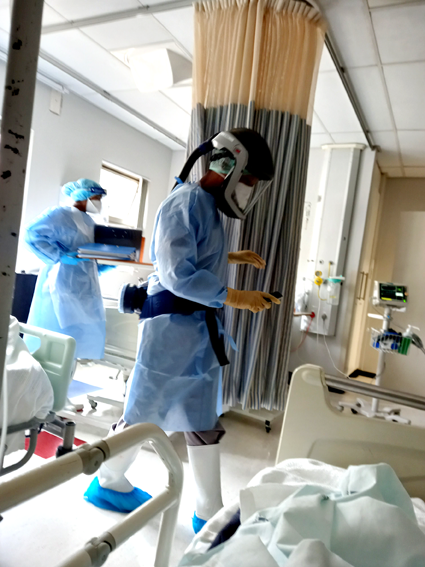
The doctors look like astronauts in filtered air-fed face helmets, while all the medical staff are totally covered in Covid blue clad body PPE, face shields, face masks, gloves (changed per patient), foot sleeves, etc, and all are exhausted from the long hours they are working. The medical staff are a crew of “Blue Angels”. Medical hazard waste boxes are everywhere.
The real struggle is seeing an ICU sister tending to a patient on a ventilator desperately trying to breathe and only able to draw 20 to 30% oxygen into their blood stream, where normal breath requires over 93% oxygen in the blood. Regular dry coughing episodes end in a situation of total fatigue and no energy.
No hospital visits are allowed so you don’t know the condition of your significant other or family member, especially if they are ventilator sedated to stop them pulling out the ventilation piping. To make things worse, there is no cell phone communication. You feel totally cut-off.
This is another psychological and emotional stress as you may not be able to “say good bye” or be able to be with or support them at the crucial moment.
Conclusion
My wife and I know five people who have died from Covid – both cattery clients and friends. Hopefully no more will occur. Both our businesses have been closed for over two months now and will only reopen when we have recovered and regained enough strength to be able to function again.
I decided to share our experiences as too many people have no understanding how horrific the Covid pandemic is.
I hope our experiences have given you a revised view of this virus and the importance to practice safe Covid management techniques and methods.
Please don’t take chances.
- Published in Uncategorized
Testing the functionality and tightness of respiratory protection devices
Dräger Quaestor and Testor test devices are highly efficient test benches that test the integrity and therefore the safety of full-face respirators.
Automatic test programmes reduce the time needed to test each full-face mask and valves, and also diving equipment.
Dräger Testor 2500/3500

Versatile testing options
Both Dräger Testor 2500/3500 models are designed for tests in the low and medium-pressure range. They are especially suitable for testing:
‒ full face masks,
‒ compressed air breathing apparatus,
‒ lung demand valves, and
‒ chemical protection suits. Comfort is a matter of position
Realistic mask testing
The test head of the Testor 2500/3500 has a natural shape. It is securely mounted, and the gel face may be replaced independently by the user as required. The design eliminates the need for any inflation and deflation of the test head.
The new gel face II is more robust due to the optimised material composition. This enables full breathing protection masks to be tested faster and better in less time.

Integration is possible in any workshop
With its compact size and robust design, the Dräger Testor 2500/3500 fits into any workshop. A base plate (optional) also enables the device to snap onto the workbench mounting of the Dräger Quaestor 5000/7000 and the Prestor 5000.
The gel face II is used for all three testing device types. This ensures maximum compatibility and increases the efficiency of your workshop.
Dräger Quaestor 7000
All static and dynamic tests of the Dräger Quaestor 7000 are carried out fully automatically. Controlled by the newly developed software, each test is carried out intuitively. For the user this guarantees high efficiency through comfort and speed.
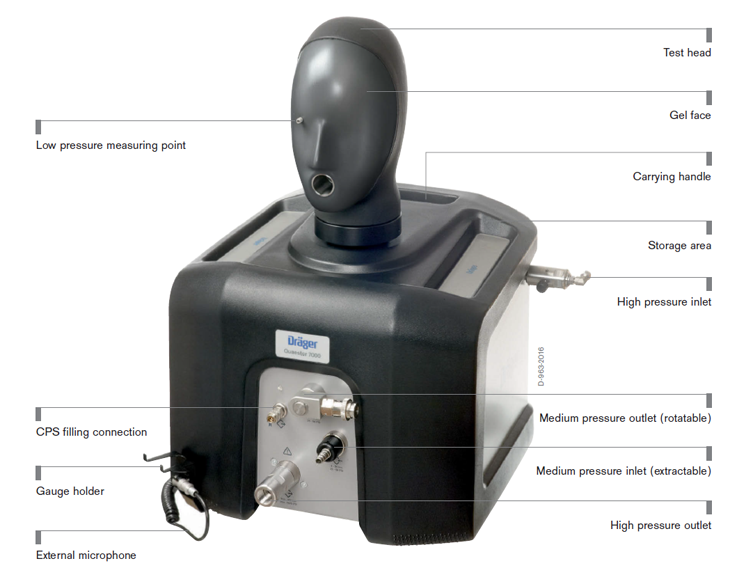
Fully-automatic static and dynamic tests
The test process is fully automated. Automatically opening and closing valves accelerate the process and
manual intervention is no longer required. An external microphone also automatically captures the switchon
point of the low pressure warning. Thus the service technician can use the time during the test for other activities.
Optimum tight fit for all mask sizes
The test head can be turned without restriction and removed as required. This flexibility allows the user to tailor the test design even more individually and comfortably to his requirements. In addition, the gel face of the test head which emulates the elasticity of the human facial skin optimizes the tight fit for all common mask sizes.

Learn more here : https://www.draeger.com/en_za/Productselector/Workshop-Solution-and-Breathing-Gas-Supply/Test-Equipment?page=1&i=safety
Focus product
Dräger Aerotest® 5000
You can use the mobile Dräger Aerotest® 5000 to test the purity of the breathing air in a low pressure system (or in a high pressure system, if you have the right accessories) in accordance with your country’s standards. The automatic system significantly improves ease of use. Menu-guided measuring, data downloads, and printing of test certificates: testing and documentation are easier with the Dräger Aerotest® 5000.
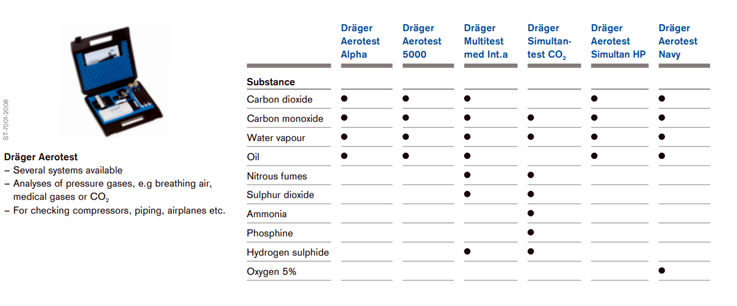
Learn more: https://www.draeger.com/en_za/Products/Aerotest-5000
- Published in Uncategorized
Man rescued from a basement in a building in Hatfield, Pretoria
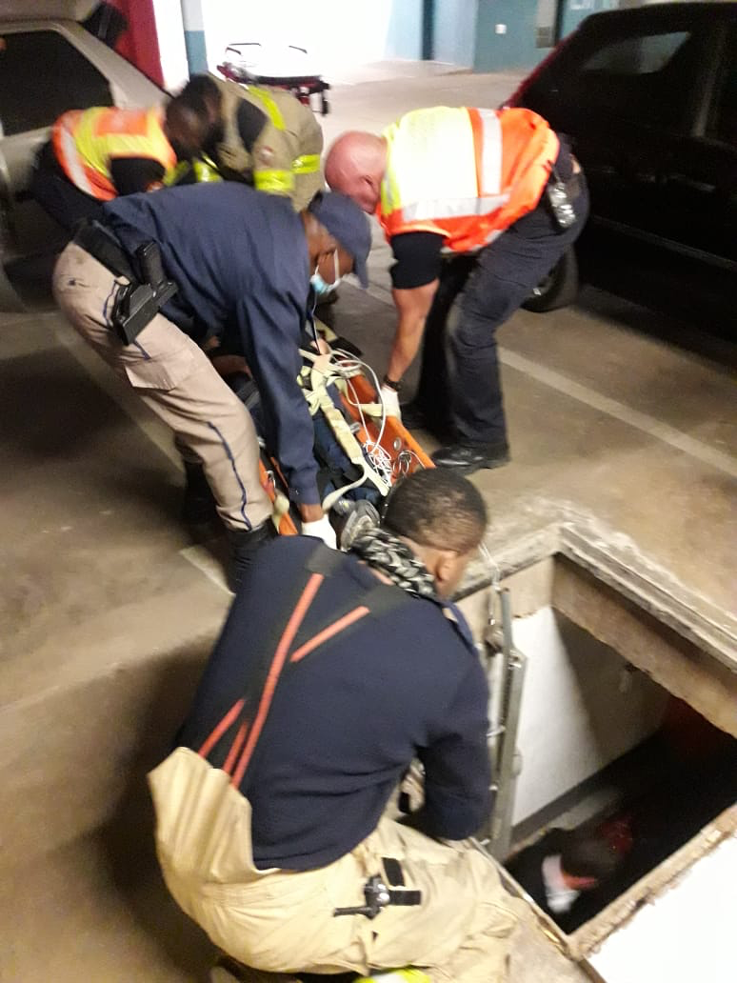
The Tshwane Emergency Services Department responded to an incident where a male of 46 years of age sustained critical but stable injuries after falling from the basement stairs of a building on June 07, 2021.
The incident occurred at a building on the corners of Prospect and Hilda Street in Hatfield, Pretoria.
The male patient was reported to have slipped from the rail of a staircase while trying to access the basement of the building for plumbing maintenance work in the basement. He apparently lost grip of the rungs of the stairs and fell approximately 3 metres down, sustaining head injuries.
Tshwane paramedics and firefighters lowered a basket and scoop stretcher where the patient was securely loaded into, after receiving bleeding and intravenous fluid treatment. He was then lifted to the surface with the assistance of members of the public in the building, Tshwane Metro Police officers and Tshwane Emergency Services personnel.
He was transported to the Mediclinic Medforum Hospital in a critical but stable condition. We would like to advise utility workers to ensure their personal safety by using appropriate personal protective clothing and fall arrest mechanisms when working from height.
Tshwane Emergency Services recommends that all workers must ensure proper grip on stairs when climbing down or up the stairs and ensure a systemic decent or climb of the stairs.
- Published in Uncategorized
Paramina Compressors from Divetek
Established in 1966, PARAMINA SA deals exclusively with Compressed Air.
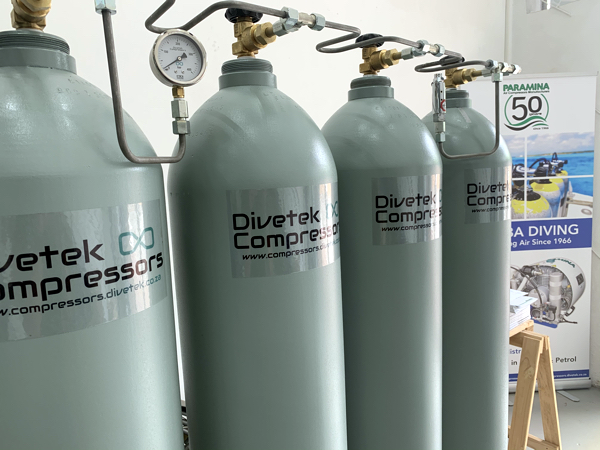
Driven to the third generation of ownership as a manufacturer of screw compressors, high pressure piston compressors and auxiliary compressed air systems suitable for industrial/general purpose air, gas (nitrogen, helium, argon), marine and offshore, as well as breathing air (diving, firefighting, oil and gas/H2S protection, motorsports, defence (air force, navy, army) and paintball/shooting sports applications.
Product Feature
Paramina “CRYO”
Compressed air contains large quantities of moisture and other contaminants.
This moisture and contaminants must be removed from compressed air, in order for the final quality of air to meet the requirements of EN12021 breathing air directive.
Cleaning of the air is achieved inside breathing air filter (BA), through absorption by molecular sieve (moisture adsorption – drying) and active carbon (oil hydrocarbons and oil odour adsorption).
When molecular sieve is saturated, BA cartridge must be changed.
However, Molecular Sieve’s absorbance capability is affected by compressed air’s temperature, which increases or decreases according to the ambient temperature as well.
The higher the air temperature, the more it decreases BA cartridge’s lifetime.
“CRYO” refrigerated dryer, decreases compressed air’s temperature to 3oC (dew point), liquifying most of the moisture which is then drained automatically to ambient.
By installing ”CRYO” before compressor’s BA filter, only a small quantity of moisture reaches BA cartridge for adsorption, thus increasing the life span of the filter cartridge.
Advantages of refrigerant dryers:
- Maintenance and operation costs are low
- Removes particles, water droplets, and oil vapours from the compressed air system
- High reliability and extends the life of your compressor
- Increases BA Cartridge life span
Distribution, Sales and Maintenance exclusively by:
Divetek Compressors
011 791 1095
Email: Compressors.divetek.co.za / compressors@divetek.co.za
Download the Paramina HP Brochure from the link below
https://compressors.divetek.co.za/paramina_hp_brochure-2020/
- Published in Uncategorized
New vehicles delivered to City of Tshwane Emergency Services Department
New vehicles were recently delivered to the Emergency Services Department to assist with the urbanization of the city.
All fire engines are built on a specialized chassis for fire engines and certified by NFPA (National Fire Protection Association) codes and standards

The service provider for the delivery of the vehicles is Fleet Africa.
- Industrial Pumper
Industrial Tanker
This major industrial pumper is the monster of all fire engines.
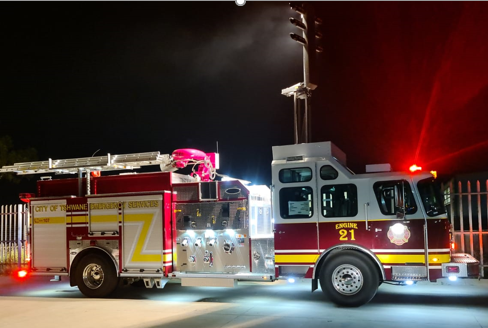
With a water tank of only 1 893 litres, a foam tank of 2000 litres and a dry chemical system of 159kg the fire engine pump can deliver 11 358 lpm, through 6 pump outlets and a 203mm deck monitor that can deliver up to 11 358 lpm over a distance of 60 metres, and a rear monitor that can deliver up to 7 572 lpm of water.
The vehicle is also equipped with the latest fire ground operation that requires a CAFS System (Compressed air foam system) to minimize the amount of water used.
Situation: Station 4 (Silverton) to assist with the refineries and the new vehicle hub of the City of Tshwane.
Foam / Tanker Unit
The foam pumper has a capacity of 2000 litres of water and 2000 litres of foam.
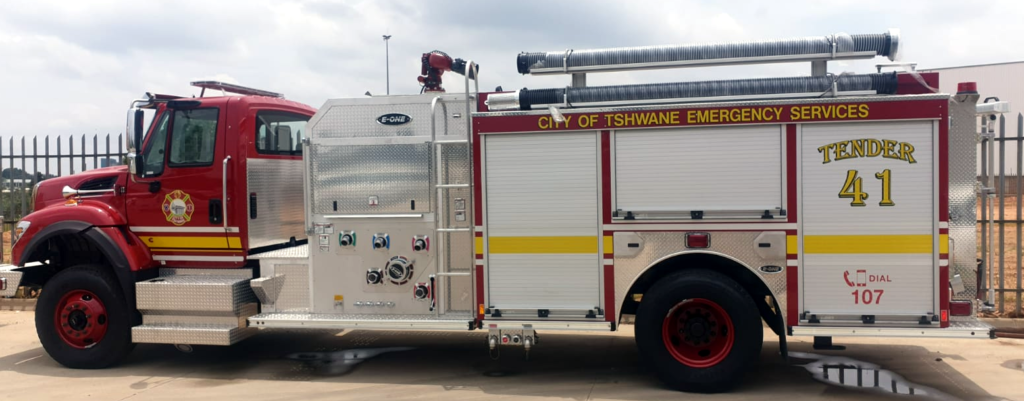
The fire pump can deliver 6000 lpm with a top monitor that can deliver 7 600 lpm
Situation: Station 2 (Rosslyn) to assist with the heavy industrial area.
Water Master Tanker
The water master tanker has a water capacity of 13 000 litres and a vacuum fire pump that can deliver 4 733 lpm and a deck monitor with the same flow rate of 4 733 lpm.
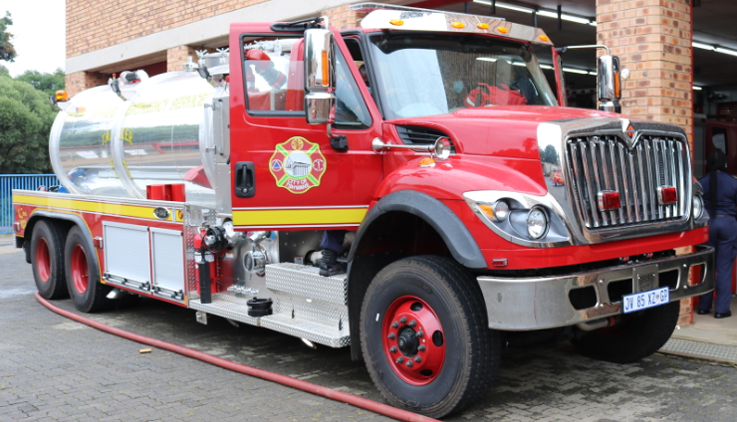
The vehicle has a portable removable dam to the capacity of 11 000 litres
The vacuum pump can fill the tank of 13 000 litres in under 3 minutes and dump the water in under 2 minutes
Situation: Station 2 (Rosslyn) to assist the foam / tanker with water supply in the heavy industrial area
Multi Patient Ambulance Bus
This major incident unit is designed for any mass casualty incident where there are a large number of patients on the scene.
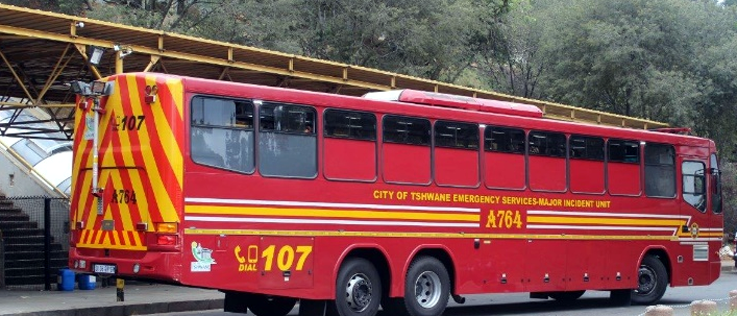
The bus is fully self-sufficient with onboard water, oxygen and a generator.
It has a custom designed lift that enables stretcher and/or wheelchair patients to be transferred from ground level into the vehicle.
The vehicle is designed to transport 12 critical priority 2 patients on stretchers and 6 priority 3 minor patients simultaneously, thereby performing the work of 15 ambulances during a major incident.
Situation: Station 1 (Central) to be deployed at any stage to any area of the city
- Published in Uncategorized
Mobile compressed air foam system from Rosenbauer – RFC CAFS Cube
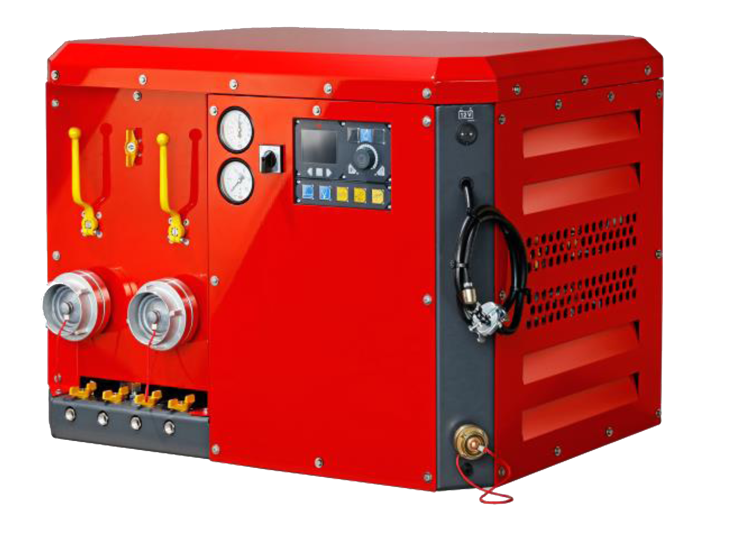
The RFC CAFS Cube is a compact, mobile compressed air foam system that can be permanently installed in existing or new fire engines and can also be implemented as a mobile solution. This makes it particularly suitable for uncomplicated and cost-effective retrofitting to upgrade an existing fleet of vehicles.
Benefits
Universal extinguishing system
• full-featured pump system with all functions of a classic portable pump
• output of pure water or generation of water foam solution or wet and dry compressed air foam
• proportioning rate adjustable to 0,1%, 1% or 3% and thus suitable for all conventional foaming agents and for wetting agent application
Intuitive operation
• immediately ready for use via a switch and logical operating philosophy via the LCS Compact
• automatic water and manual foam suction mode
• easy switching between water, foam or CAFS mode and between wet and dry compressed air foam
First-class extinguishing performance
• excellent extinguishing effect through maximum cooling, effective displacement of oxygen, and thorough penetration of the burning object
• high degree of protection against burn-back due to interruption of the oxygen supply and continuous cooling
• preventive protection against flying sparks and heat for property endangered by fire
Excellent throw range
• large safety distance from the source of fire
• makes the fighting of fires in inaccessible places and at heights easier
Visible extinguishing success
• white compressed air foam with strong adherence properties is visible to the jet pipe operator
• the evaporation of compressed air foam acts as an indicator of surfaces that are still too hot.

- Published in Uncategorized
Bravery medals bestowed to Tshwane firefighters
Executive Mayor Randall Williams honoured 18 Tshwane firefighters for service delivery excellence and bravery at an awards ceremony on 03 June 2021.
The initiative was to acknowledge the brave firefighters who took part in the Bank of Lisbon fire operation.
“Just over two years ago, the City of Tshwane’s motto “Igniting excellence” – found expression in the way our firefighters conducted themselves when they were called to aid their fellow colleagues in distress. In September 2018, an unfortunate incident befell the Bank of Lisbon Building in the City of Johannesburg when it caught fire.
“City of Tshwane firefighters were called to help extinguish the deadly blaze. The call received a swift response from our Emergency Services Department, our firefighters were immediately dispatched to assist. They took on this mission with grace and humility notwithstanding the deadly risks associated with such an operation.
When Johannesburg EMS reached out to Tshwane, they knew they could count on the skills and services our firefighters, they knew they were reaching out to dedicated professionals.
“Men and women in uniform from various disciplines play a critical role in keeping our communities safe, be it through crime fighting, responding to emergencies, assisting the ill or putting out fires. They do all of this but do not always get the recognition they deserve.
“I believe that firefighters are some of the most courageous people in the world, they are tasked with the unique responsibility of running towards danger to put out fires, conduct rescues and evacuations. This a unique act of bravery that deserves our praise and respect.
“I stand here on behalf of the Tshwane leadership to express our gratitude for the outstanding work you did at the Bank of Lisbon and for many other emergency cases you attended to in our City.
“That Bank of Lisbon Building fire resulted in the demise of three firefighters, this shows the immense, almost impossible task you were faced with. But despite the challenges and the dangerous situation you were in, you still put your best foot forward.
“For that we would like to say thank you all for being true professionals and for flying the Tshwane flag high. You are an inspiration and as a City, we couldn’t be more proud.
You have earned these bravery medals, every single one of them. May these medals motivate you to rise above all odds and to continue serving our communities with dedication and selflessness”.
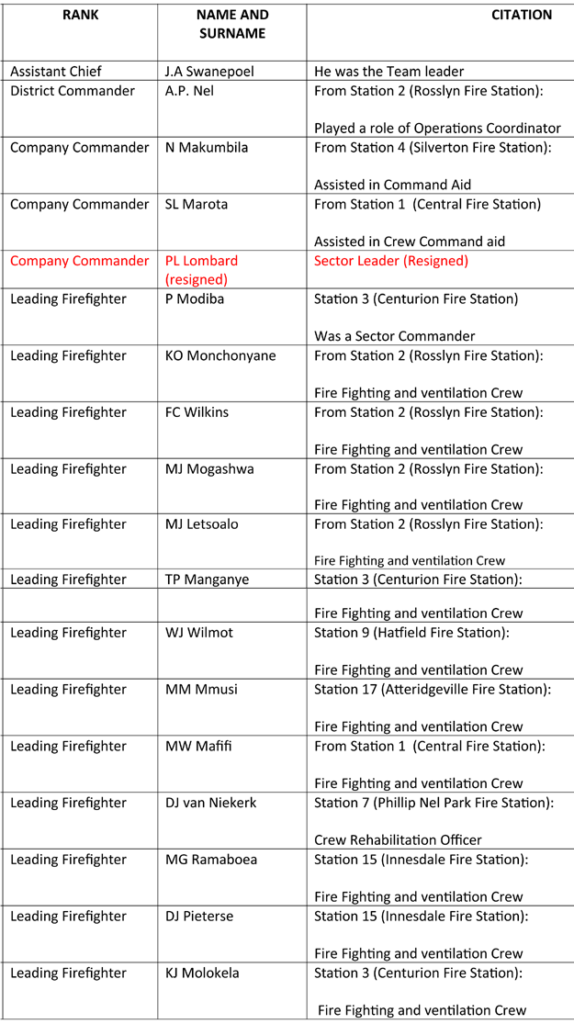
- Published in Uncategorized




